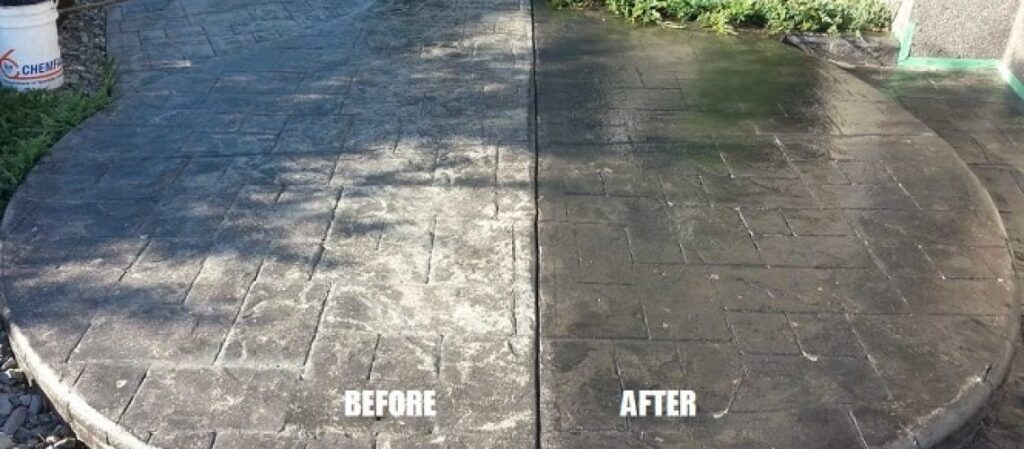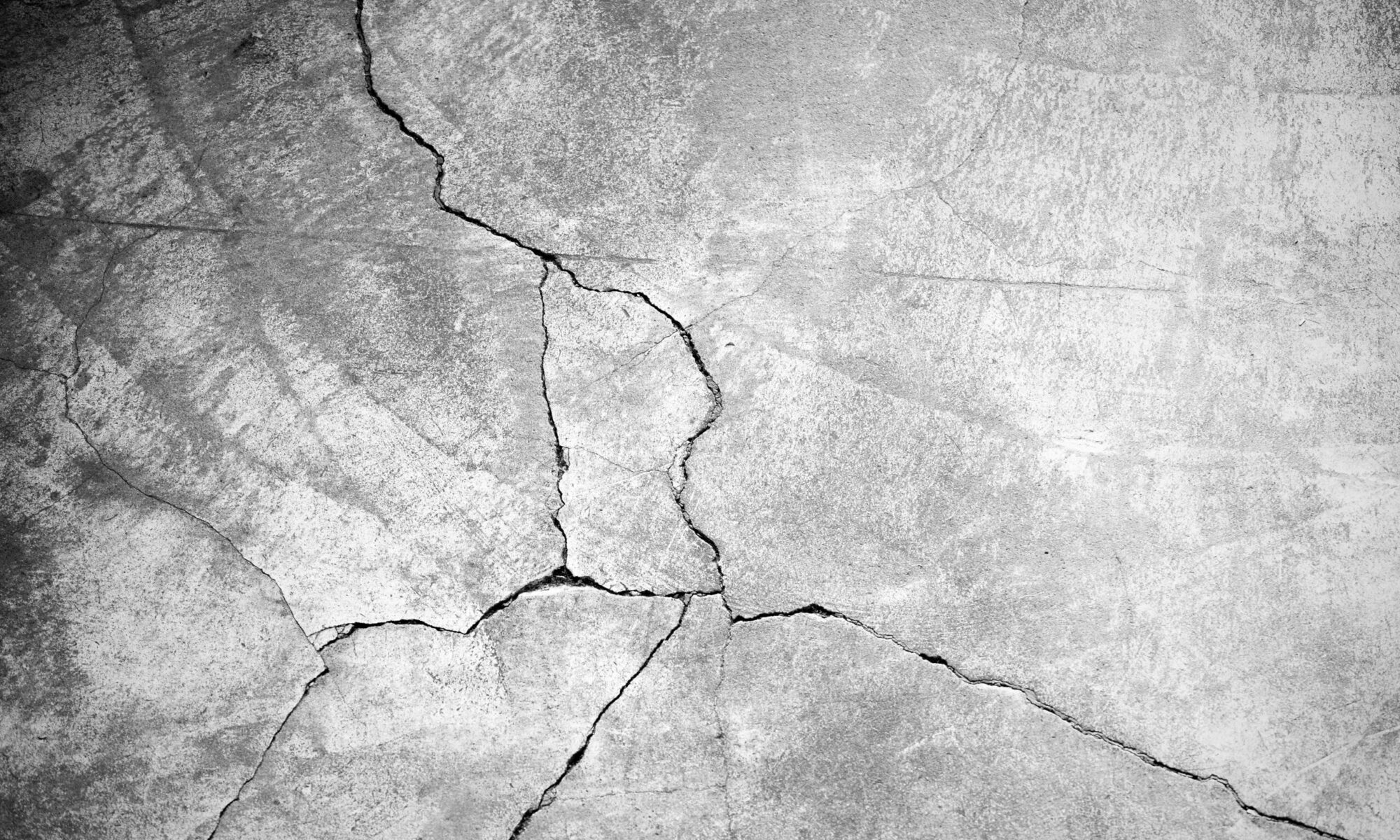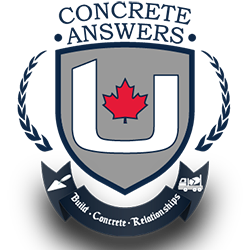Wondering what the professionals are using in Canada? Get the right info here.

Hello, and welcome to Concrete pros, I’m Brett Desroches, I’m here with my friend Rob King and today we are going to talk about choosing the right concrete sealer.
ROB: So Brett, what is concrete sealer and why do you even need it?
BRETT: Concrete sealer is used to water-proof and dust-proof your concrete. It’s also used to protect your concrete from the elements so you want to make sure your concrete is protected because it is expensive to tear it out and pour it again.
ROB: What are the different types of sealer? I know you got acrylic, water-based, what are all the differences out there? It seems there are a lot of choices. How do I choose the right Concrete sealer for me?
BRETT: There are a lot of choices. There’s epoxies, urethanes, acrylics – there is a multitude of different products. Really, what we’re going to talk about today are the topical sealers. The topical acrylics, the coloured sealers, but there are many different kinds.
Appearance of Concrete Sealer
ROB: What will the sealer do to the appearance of the concrete?
BRETT: Well, with a high gloss product it’s going to leave the concrete looking wet – like it does after it rains. If you’re using a coloured sealer it’s going to leave a uniform solid colour. In addition to that there’s tints available and if you put a little bit of tint in the sealer you can get a translucent look as well. There’s also curing and sealing products (like in Uniseal). So after you place your concrete down, you put Uniseal down and it’s also going to cure it by retaining the moisture in the slab.
ROB: So kind of like a 2-in-1?
BRETT: Just like it.
ROB: What is in that sealer and why does it give off that strong smell?
BRETT: It’s a flammable-based carrier. It is very strong, we recommend that you always use a face mask, gloves and read the MSDS. But really, for all intent and purpose it’s a solvent and a solid acrylic. When you put the sealer down the solvent will flash off with the temperature leaving the acrylic on the concrete. And depending on the percentage off acrylic you have in your sealer is going to determine what the final finish looks like.
Choosing the right Concrete Sealer
ROB: I noticed a lot of people lately are doing concrete counter tops. Is this sealer food safe?
BRETT: Water-based sealers are recommended for counter tops and they’re definitely food-safe.
ROB: How do I choose the right sealer for my needs?
BRETT: Choosing the right sealer depends on the type of concrete you have. There’s many different kinds, there’s power trowelled finish, broom finished, exposed aggregate, stamped/decorative, there’s a whole array of different types of concrete. Depending on what type you have is going to determine what kind of sealer you require.
ROB: Why use a professional grade product and not one I can find at any hardware store?
BRETT: Using a professional grade product has its advantages because it’s going to last a lot longer. A lot of times when you’re prepping your concrete that’s going to take a lot of time, so if you’re going to put in the time to make sure you get your concrete clean, you’re going to make sure it’s dry, you’re going to want to use a professional product that’s going to last a long time. It’s something you’re going to be happy with.
Conditions & Application of Sealer
ROB: What are the right conditions to use it? Is there a proper time of day or a proper temperature?
BRETT: Usually in the morning as long as there’s no moisture on the concrete and it’s somewhere between 5-15 degrees Celsius. Now, that is the concrete temperature and if you want to test your concrete out you can just get a little temperature gun and check the temperature of the concrete. Because if your concrete is too hot it’s not going to let your sealer stick to it. The sealer will just sit on top, it will dry and then it’s going to bubble or it’s going to blush.
ROB: So it’s not necessarily the ambient temperature, but the temperature of the substrate.
BRETT: That’s correct.
ROB: What is the coverage of this sealer and how long can I expect it to last?
BRETT: You can expect concrete sealers to last about a year, they are a maintenance coating. Depending on how much you drive on it too. Your patio, for example, is going to last a little longer than your driveway would. But for the most part you will get 250 square feet per gallon if your concrete has never been sealed before. If it has (been sealed before) your coverage is going to get a little bit better.
ROB: So is it better for me to do one heavy application to make sure it’s really thick or solid, or is it better to do a couple applications?
BRETT: It’s definitely better to do two thin applications. The first one will act as a bond, the second one will bond to the first coat. If you put a real thick coat down, there’s a chance it can trap some moisture underneath and you’ll get something called blushing. Which means it’ll turn white.
Preparing Concrete for sealing
ROB: What if my garage or driveway has oil spots?
BRETT: if it has oil spots on it you’re going to want to remove those oil spots, because the sealer is oil resistant. So, it won’t stick to those areas (with oil spots). If there’s areas that are dirty you’re going to definitely want to clean them first. If you seal over top of a dirty driveway it’s going to be there forever and you’re not going to be happy with the result. There’s plenty of products on the market right now, such as the Uniclean product that will take those stains out for you prior to sealing. Uniclean is very simple to use. You dump it out onto the oil spot, you scrub it a little bit and just let it dry. It will turn into a powder and you just wash it off with our Bullseye nozzle.
ROB: How do I apply (sealer)? Do I have to be a professional or could a home owner do it?
BRETT: A homeowner can apply this product, or a professional, of course. You could use one of our professional concrete sprayers. Generally a home owner will use a ½” nap roller with a cardboard liner in it, a metal paint tray and a frame. You want to make sure that you don’t use anything with plastic in it, because the solvent is very aggressive. It will melt the plastic in your tray or in your roller.
Where it can go wrong with Concrete Sealer.
ROB: So as a first time concrete sealer. What would be some of the common mistakes people make and what can I do to fix them?
BRETT: The most common mistake is definitely surface prep. You want to make sure that concrete is clean, dry, make sure any oil stains are out. The second most common mistake is if you’re putting it down when the temperature is too warm. It’s going to come out like silly string out of your sprayer. Because it’s going to effectively dry flash off before it has a chance to stick to the concrete.
There’s also a problem with blushing. If you put it on too thick, you can trap moisture underneath the surface. That’s going to give you some clouding. Now, it’s not the end of the world if you do have some clouding; there’s a product on the market called Resolve. Resolve is applied down over the clouded area, scrub it, let it dry. That will effectively drive the existing sealer into the concrete and prepare it for another coat of our acrylic sealers.
Do you want to see how the concrete sealer is done? Watch our Applying Sealer video, which will show you the different ways to apply concrete sealers.
If you’re interested in any of (the mentioned products) please click the links for more information.
Support us by liking this Blog. You can also follow us at #ConcreteAnswers. I’m Brett, this is Rob and thanks for watching Concrete Pros we’ll see you next time.
Have more more questions about Choosing the right Concrete Sealer? Ask us on our forum “MUSTER POINT” to get a reply from one of our Concrete Pro’s
We also found a great resource site for our American friends, Check out this article on Concrete Sealer.
Transcribed from and episode of Concrete Pro’s with Brett Desroches.

